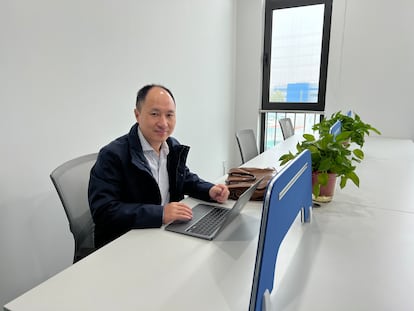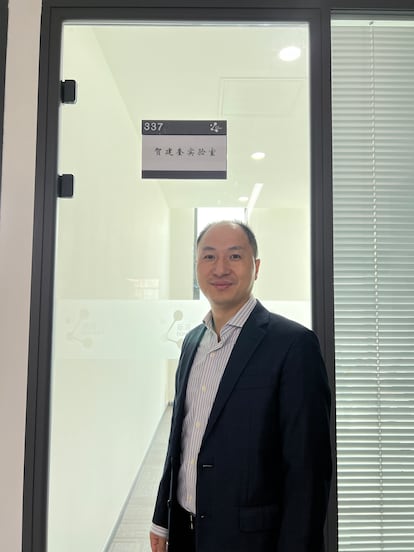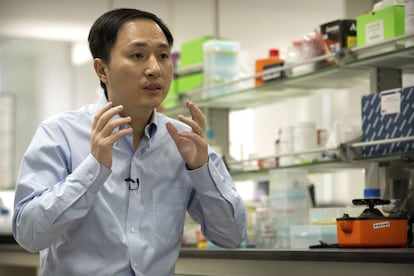The man behind the first genetically modified human babies wants to resume experimenting
The scientific community is aghast at He Jiankui’s return after three years in prison and compares him to Nazi doctors

He Jiankui, the scientist who created the first genetically modified human babies in one of the most dangerous medical experiments ever, has been released from prison and wants to return to science. In several email exchanges with EL PAÍS (He won’t give personal interviews), the Chinese biophysicist says he wants to work on cures for genetic diseases in children and adults. Most of the international experts we interviewed for this report, including a Nobel laureate, are aghast at the prospect of He’s return. Kiran Musunuru, an expert in gene editing, said He’s work is “as serious as the war crimes committed by Nazi doctors during World War II.”
In November 2018, the 38-year-old scientist who trained in China and the United States, announced the birth of twin girls known by their pseudonyms, Lulu and Nana. They were the first human beings with genomes edited using CRISPR (Clustered Regularly Interspaced Short Palindromic Repeats). He stated that his goal was to modify their CCR5 gene so the girls would be resistant to the AIDS virus, since both their parents were infected. The announcement was initially greeted with jubilation by Chinese authorities, but it was later revealed that the experiments had violated the most fundamental ethical and medical standards.
The world soon learned that He was aware that the embryo genomes contained unwanted errors (mutations), but still proceeded with an in-vitro fertilization (IVF) procedure. The identities, whereabouts and health status of the twins and a third girl born to another couple in 2019 have been among China’s best-kept secrets. Absolute secrecy is necessary because of the massive consequences of their identification – they are the only three representatives of a new human lineage with rewritten genomes that still have unknown health or other consequences.
In 2019, He was sentenced to three years in prison by a Chinese court, and during his trial it was revealed that he wasn’t working alone. Two of his collaborators also went to prison, and several Chinese and international experts, including some US researchers, knew about his plans and encouraged them. The scientist was released from prison a few months ago. “I am living pretty good now,” he writes. “I spent some time with my family, and relocated to Beijing. I picked up a new sport: golf, and I am enjoying it.”
He Jiankui has rented office space in Beijing’s Daxing district where he works with at least two others in his new non-profit organization, the Rare Disease Research Institute. The scientist says this new “laboratory” will focus on treating “children and adults, but not embryos,” and aims to discover cures for genetic diseases like Duchenne muscular dystrophy, a rare disease that mostly affects boys and can be fatal.
Funding from Alibaba and Tencent
He Jiankui has posted a number of photos on social media with supposed families of people suffering from genetic diseases. “Many affected families wanting to donate money have contacted me, but I have not yet decided whether to move ahead,” he writes. “My goal is to raise one billion yuan [$147 million] from Jack Ma [the founder of Alibaba], Huateng Ma [the founder of Tencent] and other billionaires. The first donation I received came from the US.” He says he will be able to cure some genetic diseases in about three years if he is able to raise that much money.
He didn’t answer our written questions about his controversial experiments, and only says that he realized in prison that, “I have been moving too quickly. My future research will be transparent and open to all. Everything will be published on social media and reviewed by an ethics board and an international team of scientists.”
Hardly anyone disagrees with He that the cost of gene therapy is too high. The few gene therapies developed so far are some of the most expensive drugs in the world. A drug recently approved in the US to treat an inherited blood disease is the most expensive of all, with a price tag of $3.5 million per patient. He says his goal is to bring the cost of these therapies in China down to one million yuan ($147,000), but doesn’t say how he plans to achieve this. There have been many resounding failures in this very sensitive field. The most recent was the death in the US of Terry Horgan, who suffered from Duchenne muscular dystrophy, during a million-dollar clinical trial that his brother helped finance.

Kiran Musunuru, an American scientist and physician at the University of Pennsylvania in the United States, attributes the high price of these therapies to a very expensive development process. Musunuru is well acquainted with He Jiankui’s work and wrote a book about it – The CRISPR Generation: The Story of the World’s First Gene-Edited Babies. “You can’t take shortcuts in this field and that’s exactly what He did,” said Musunuru. “He bought cheap CRISPR materials that were not approved for use in humans, injected them into embryos and produced the pregnancies without any apparent concern about the safety of the mother or the children. He Jiankui is the last person I would trust to produce less expensive therapies. Once again, he is taking shortcuts to pursue fame.”
He Jiankui hasn’t provided any specifics about his experiments with embryos, nor has he published a detailed study. Technology Review received He’s unpublished manuscript in 2019 from a source, which revealed that the gene editing of the embryos had been flawed and that at least one of the girls carried unwanted errors in her genome.
EL PAÍS contacted some of the world’s leading experts in gene editing and bioethics who participated in international discussions after He’s experiments on human embryos were revealed. All agreed on the need to restrict them, and many countries, including China, have banned these practices. The experts we consulted believe that current gene-editing tools are not mature enough to be used on sperm, eggs or embryos, and would introduce changes in the human genome that would be passed from generation to generation. None of them are in favor of any attempts to rehabilitate the Chinese scientist’s reputation, especially not before he publishes a detailed description of his experiment.
David Baltimore, professor emeritus of biology at the California Institute of Technology and winner of the Nobel Prize for Medicine in 1975, said: “Everyone deserves a second chance, but He Jiankui’s mistake was so colossal that I would never agree to funding his new experiments in biomedicine.”
George Church, a leading expert on gene editing at Harvard University, believes He won’t be stopped from moving forward with his new research. “The world of science tends to give second chances,” said Church. “But we need very close monitoring of any experimental therapy. There are many clinical trials and even approved therapies that have negative consequences. The babies whose genomes were edited may not have suffered any negative consequences, but I hope their health is being closely monitored.”
Learning from mistakes
Last year, Ruipeng Lei and Renzong Qiu, two bioethics experts from China’s Huazhong University of Science and Technology and the Chinese Academy of Sciences, called on authorities to monitor the health of the three girls with genomes edited by He. In a September 2022 paper, Lei and Qui argue for treating CRISPR-edited individuals as vulnerable, and should be provided with an extraordinary level of medical and psychological monitoring so that they are never publicly identified and exposed to stigmatization and discrimination, or the temptation to exploit their situation for fame and money.
He has promised to speak about his work at scientific conferences in Europe and the United States this year, and has already been invited to give a talk at the University of Oxford (UK) by Eben Kirksey, an anthropologist and author of The Mutant Project. Kirksey says that the plans for the talk are still being worked out, and that the university’s policy is not to comment publicly on the speakers it hosts. But he believes it essential for He to thoroughly explain what happened. “Some eminent bioethicists think that He should not be allowed to publish his research. I don’t agree. There is a lot to learn from his ethical mistakes and his scientific research for applying CRISPR in reproductive medicine,” said Kirksey.

Kiran Musunuru, the CRISPR expert who compared He to Nazi doctors, said: “I can’t imagine anyone letting those [Nazi] doctors practice again. As an ex-convict, He Jiankui should be prevented from entering other countries to participate in international conferences.”
He Jiankui recently shared on social media a New York Times article by Fyodor Urnov, an expert in gene editing at the University of California, Berkeley. Urnov advocates for greater commitment to developing cures for rare and fatal diseases using gene editors like CRISPR. In his posts, He wrote that such efforts would cure cancer and Alzheimer’s disease in the future.
But Urnov was highly critical of He when EL PAÍS asked him about the Chinese scientist’s work. “Patients with rare genetic diseases and their families are desperate for a cure,” said Urnov. “Doctors and scientists must be exactingly careful about the possible negative effects. He Jiankui has shown that he cannot abide by the most fundamental ethical and medical standards. He should be banned for life from conducting any experiments involving human health. Everyone deserves a second chance except when innocent lives are at risk.” But Urnov acknowledges the large shadow cast by He Jiankui. “It’s a nightmare. No one can have a conversation about gene therapy anymore without his name coming up.”
Lluis Montoliu, a researcher at Spain’s National Center for Biotechnology and an expert on CRISPR gene editing, provides one last reason for not accepting He back into the fold. Montoliu says He’s experimental techniques were not justified because other commonly used methods such as sperm washing would have enabled the girls to be born without HIV.
In March, Montoliu will be among the dozens of scientists attending the Third International Summit on Human Genome Editing in London, the field’s most significant conference. Montoliu warns that it is still too early to use gene editing with human reproductive cells and embryos, since the risks are unknown, but primarily because, “there is no condition that cannot be treated using other methods.”
Sign up for our weekly newsletter to get more English-language news coverage from EL PAÍS USA Edition
Tu suscripción se está usando en otro dispositivo
¿Quieres añadir otro usuario a tu suscripción?
Si continúas leyendo en este dispositivo, no se podrá leer en el otro.
FlechaTu suscripción se está usando en otro dispositivo y solo puedes acceder a EL PAÍS desde un dispositivo a la vez.
Si quieres compartir tu cuenta, cambia tu suscripción a la modalidad Premium, así podrás añadir otro usuario. Cada uno accederá con su propia cuenta de email, lo que os permitirá personalizar vuestra experiencia en EL PAÍS.
¿Tienes una suscripción de empresa? Accede aquí para contratar más cuentas.
En el caso de no saber quién está usando tu cuenta, te recomendamos cambiar tu contraseña aquí.
Si decides continuar compartiendo tu cuenta, este mensaje se mostrará en tu dispositivo y en el de la otra persona que está usando tu cuenta de forma indefinida, afectando a tu experiencia de lectura. Puedes consultar aquí los términos y condiciones de la suscripción digital.









































